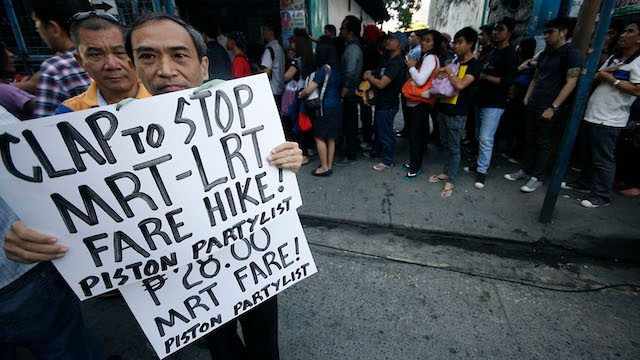SUMMARY
This is AI generated summarization, which may have errors. For context, always refer to the full article.

MANILA, Philippines – Following criticism over its move to raise fares of Metro Manila’s main mass transit lines, the Department of Transportation and Communication (DOTC) said it is open to the creation of a regulatory body for fare adjustments.
Transportation Secretary Joseph Emilio Abaya made the statement at a Senate hearing on the Light Rail Transit (LRT) and Metro Rail Transit (MRT) fare hikes on Monday, February 2.
Responding to Senator Francis Escudero, who asked if his agency has the authority to propose and implement the fare hike, Abaya cited Executive Order 125-A or the Reorganization Act of the Ministry of Transportation and Communications.
Section 5, paragraph P of the order states that the DOTC has the power to “determine, fix and/or prescribe charges and/or rates pertinent to the operation of public air and land transportation utility facilities and services….”
Abaya said, however, that he has no objections to the proposed creation of a rate-setting agency to handle LRT and MRT fare adjustments.
“There’s a need and we fully welcome and encourage Congress to create a rail regulatory authority to exercise the rate-setting functions residually left with DOTC,” the transportation chief said.
Senator Grace Poe, who chaired the hearing, said the Senate public services subcommittee will study the proposal.
Instead of creating a new agency, Escudero proposed the possibility of amending the Land Transportation Franchising and Regulatory Board (LTFRB) charter to include the regulation of MRT and LRT fare adjustments in its mandate.
‘Unjust fare hike’
During the hearing, representatives of commuters’ welfare groups aired their complaints about the fare hike.
Wilson Fortaleza, spokesman for Partido Manggagawa, questioned the authority of the DOTC to propose, approve, and implement the fare hike.
“There was no public hearing. The DOTC is the proponent [of the fare hike], they approved it, they implemented it. There is a problem in regulation,” Fortaleza said.
He added: “Ang tingin namin [sa rate hike], arbitrary at unjust. Kapag nagtataas ng pamasahe sa bus, pa-piso-piso, dumadaan sa public hearing. Ito double, P676 a month [ang dagdag].”
(We think the rate hike is arbitrary and unjust. When buses raise fares, it’s in one-peso increments and the process goes through a public hearing. This rate hike is double the original amount, coming to P676 a month in additional expenses.)
Under the new scheme which came into effect January 2015, the maximum fare on the train lines will cost between P28-30 ($0.63-0.67), from the current P15-20 ($0.34-0.45).
Since announcing the fare hike in December 2014, the DOTC has been under fire for what some sectors called an ill-timed move, and a burden to commuters’ pockets.
In the sample computation presented by Poe, commuters stand to shell out an additional P676 a month if they rode the MRT3 from end to end during a 26-day work month.
Poe said that amount could be spent on basic commodities instead.
Abaya defended the DOTC’s move to implement the fare hike, saying the proposal has been discussed since 2011.
But the DOTC decided to hold off on the plan due to the price increase of other basic commodities, the secretary said.
“The government is sensitive to the plight of the people,” Abaya added.
He also said the agency would not have proceeded with the fare hike without the approval of the economic cluster. – Rappler.com
US$1=P44.68
Add a comment
How does this make you feel?
There are no comments yet. Add your comment to start the conversation.